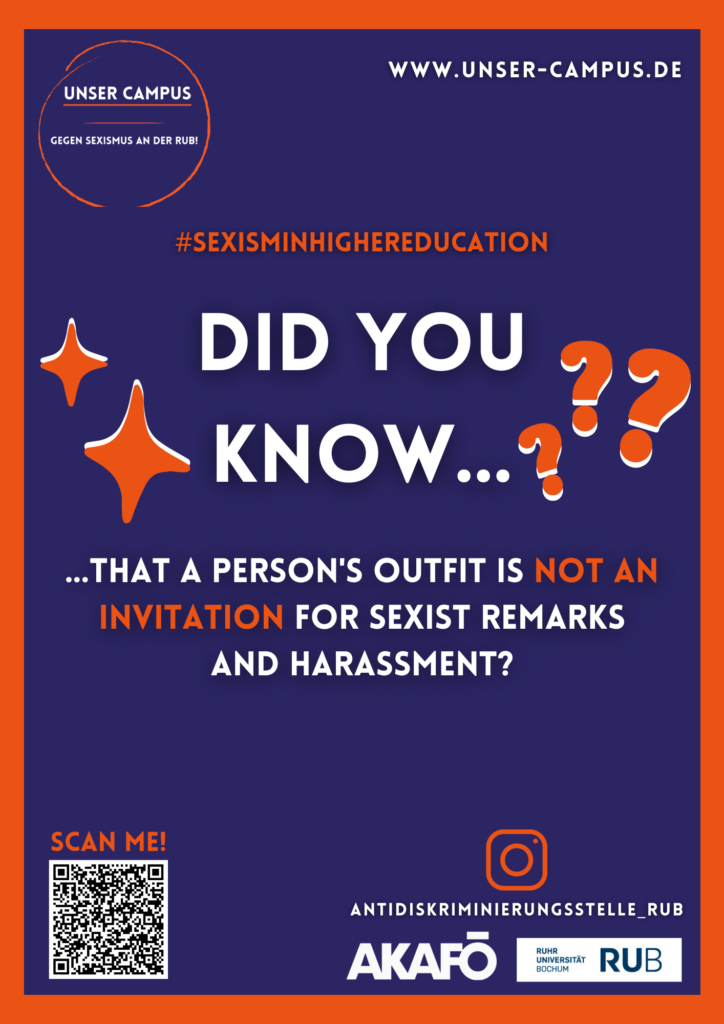It’s a warm summer’s day. You may have just grabbed a cool drink and are strolling across campus to your next class. Then you hear: „Hey, you’ve got a really hot arse in that dress!“ or „But you shouldn’t wear shorts with your body.“
Such sexualised and standardising comments about our appearance and the clothes we wear are often a mixture of catcalling and sexist lookism. You can find out more about catcalling here . In this article, we would like to turn our attention to lookism as a form of discrimination.

Lookism refers to the discrimination or disadvantaging of people on the basis of their appearance, body or physical appearance and concerns not only what is considered attractive or aesthetically pleasing, but also characteristics such as height, weight, age, skin colour, facial shape and gender expression. This form of discrimination is often based on stereotypical notions of beauty, norms and expectations that are ingrained in society and tell us, for example, that only bodies that are fit, powerful and „beautiful“, in the sense of slim, white, healthy, athletic, etc., conform to the norm or a notion of „normal“.
Lookism is closely linked to other forms of sexist discrimination and queer-hostile prejudice. In a society based on heteronormative and binary gender concepts, people who do not conform to idealised beauty standards are often marginalised or discriminated against. FINTA* (women, inter, non-binary, trans and agender people) as well as BiPoC (Black, Indigenous and People of Colour) are particularly often affected by lookism, as their bodies are often seen as the subject of supposedly self-evaluation and control.
Examples of lookism in everyday university life:
- Outfit/clothing: In university contexts, lookism can become visible through dress codes or implicit expectations regarding the appearance of students and lecturers. For example, people who do not conform to the stereotypical image of „academics“ may be subject to prejudice or devaluation due to their style of dress or outward appearance. Clothing itself does not have a gender, but we assign a binary gender to clothing. For example, we read dresses as feminine and suits as masculine, even though they are open to everyone, and anyone can wear them. Generally speaking, everyone should wear the clothes they feel comfortable in, regardless of gender or body shape.
- Social media and search engines: Platforms such as Instagram or TikTok can reinforce lookism by promoting certain body norms and beauty ideals and marginalising and making invisible people who do not conform to these norms. In addition, search engines can use algorithms that favour certain images or content that conform to common beauty standards, increasing the pressure on people to conform to these standards. For example, if you search for male-connoted first names, male people in suits will be displayed, but if you search for female-connoted first names, the search result will show, for example, naked female breasts.
- Normative constructs of bodies: Lookism often manifests itself in discrimination against people based on their body weight, with stereotypes such as lack of discipline or lack of sporting activity being applied to weight alone. Likewise, trans people often experience queer-hostile lookist discrimination, as their bodies are judged as deviating from binary gender norms.
Lookism is a deeply rooted form of discrimination that not only has individual effects but can also reinforce structural inequalities. It reproduces heteronormative, racist and ableist stereotypes and reinforces existing power structures by favouring certain body types and forms of expression and marginalising others: „Lookism is a concept that cannot simply be placed in the same category as other -isms (such as racism or sexism). Rather, it offers a framework for analysing and a name for diverse experiences of discrimination based on the devaluation and depreciation of bodies and thus covers gaps in the other concepts“ (FUMA DIGITAL – #LOOKISMUS). To combat lookism, it is important to promote more conscious and inclusive standards of beauty and appearance that embrace the diversity of human bodies and expressions. Existing power structures must be challenged to create spaces for the recognition and celebration of diverse identities and expressions.
With its anti-discrimination directive, Ruhr-University Bochum has created a basis for reporting and penalising discrimination on the basis of lookism.
With the project „Our campus – a campaign against sexism at RUB!“ and our cooperation partners, we want to counter the discriminatory phenomenon of lookism and campaign for a campus where people are valued regardless of their appearance.
Sources and further reading:
- Avemann, Katharina/Kagerbauer, Linda (2019): “Loose hate, not weight” Lookismus und Bodyismus in der Mädchenarbeit. In: Betrifft Mädchen: fat! (mädchen*) Körper von Gewicht. Beltz Juventa, Heft 2, S. 65 – 70
- Diamond, Darla/Pflaster, Petra/Schmid, Lea (Hrsg.): Lookismus. Normierter Körper – Diskriminierende Mechanismen – (Self-) Empowerment. Unrast
- Kleidung und Sexismus · DLF Nova (deutschlandfunknova.de) (abgerufen am 17.2.2024)
- Lookismus (uni-koeln.de)
- Lookismus als Unconscious Bias: Der Einfluss des Aussehens auf Personalentscheidungen | SpringerLink
- Lookismus erklärt von FUMA Fachstelle Gender & Diversität NRW (gender-nrw.de)
- Sexismus | bpb.de
- Sexismus im Alltag – Gender – jetzt.de
- Sexismus im Alltag (bmfsfj.de)
- Sexismus: Erkenne ihn. Benenne ihn. Beende ihn. (coe.int)
- Stereotype: „Sexismus ist heute subtiler“ – Spektrum der Wissenschaft
- Subtile Erscheinungsformen von Sexismus | Sexismus | bpb.de
- Vedder, G., & Vedder, M. (2012). Able-Bodyism, Lookism und Diversity Management. In R. Ortlieb & B. Sieben (Hrsg.), Geschenkt wird einer nichts – Oder doch? Festschrift für Gertraude Krell (S. 163–168). München: Hampp
- Wissen über Sexismus « Bündnis „Gemeinsam gegen Sexismus“ (gemeinsam-gegen-sexismus.de)

